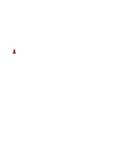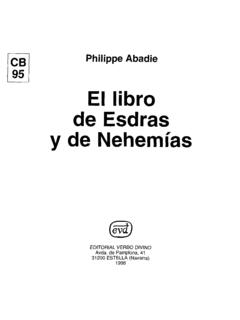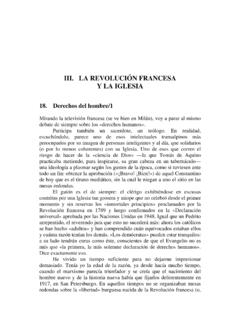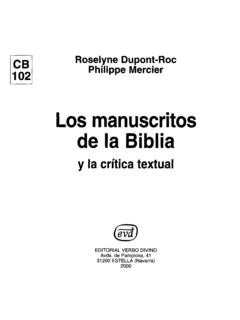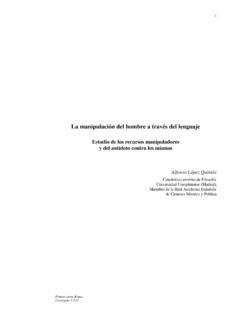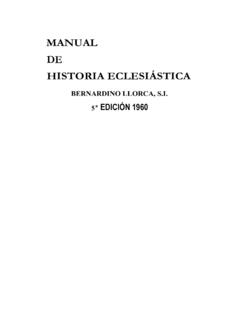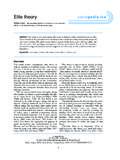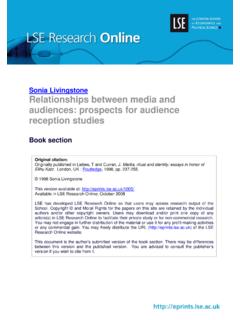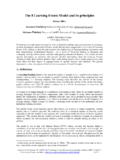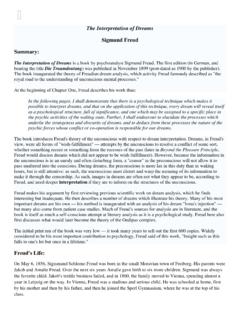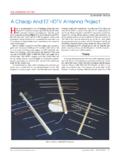Transcription of David Lodge - Modern Criticism and Theory
1 SECOND EDITION Modern Criticism and Theory A Reader Edited by David Lodge Revised and expanded by Nigel Wood An imprint of Pearson Education Harlow, England London New York Reading, Massachusetts San Francisco Toronto Don Mills, Ontario Sydney Tokyo Singapore Hong Kong Seoul Taipei Cape Town Madrid Mexico City Amsterdam Munich Paris Milan Questia Media America, Inc. Publication Information: Book Title: Modern Criticism and Theory : A Reader. Contributors: David Hanks Lodge - author. Publisher: Longman. Place of Publication: Harlow, England. Publication Year: 1999. Page Number: iii. Pearson Education Limited Edinburgh Gate Harlow Essex CM20 2JE United Kingdom and Associated Companies throughout the world. Visit us on the World Wide Web at: David Lodge 1988 Second Edition selection and editorial material David Lodge and Nigel Wood 2000 All rights reserved; no part of this publication may be reproduced, stored in a retrieval system, or transmitted in any form or by any means, electronic, mechanical, photocopying, recording or otherwise without either the prior written permission of the Publishers or a licence permitting restricted copying in the United Kingdom issued by the Copyright Licensing Agency Ltd, 90 Tottenham Court Road, London W1P 0LP.
2 First edition published 1988 Second edition published 2000 ISBN 0-582-31287-6 PPR British Library Cataloguing-in-Publication Data A catalogue record for this book is available from the British Library Library of Congress Cataloging-in-Publication Data Modern Criticism and Theory : a reader/edited by David Lodge ; revised by Nigel Wood. -- 2nd ed. p. cm. Includes bibliographical references (p. ) and index. ISBN 0-582-31287-6 1. Criticism --History-- 20th century. 2. Literature--History and Criticism -- Theory , etc. I. Lodge , David , 1935- . II. Wood, Nigel, 1953- . 1999 801'.95'0904--dc21 99-21398 CIP 10 9 8 7 6 5 4 3 2 04 03 02 01 00 Set by 35 in 10/11 pt Sabon Produced by Pearson Education Asia (Pte) Ltd., Printed in Singapore (KKP) CONTENTS Foreword xi Preface to the second edition xv Acknowledgements xvi A CONTENTS ARRANGED HISTORICALLY 1 Ferdinand de Saussure 1 The object of study 2 2 Walter Benjamin 10 The Storyteller 11 3 Roman Jakobson 30 Linguistics and poetics 31 The metaphoric and metonymic poles 56 4 Jacques Lacan 61 The insistence of the letter in the unconscious 62 5 Jacques Derrida 88 Structure, sign and play in the discourse of the human sciences 89 6 Mikhail Bakhtin 104 From the prehistory of novelistic discourse 105 7 Tzvetan Todorov 137 The typology of detective fiction 137 8 Roland Barthes 145 The death of the author 146 Textual analysis: Poe's 'Valdemar' 151 9 Michel Foucault 173 What is an author?
3 174 10 Wolfgang Iser 188 The reading process: a phenomenological approach 189 11 Julia Kristeva 206 The ethics of linguistics 207 12 Harold Bloom 217 Poetic origins and final phases 218 13 E. D. Hirsch Jr. 230 Faulty perspectives 231 14 M. H. Abrams 241 The deconstructive angel 242 15 J. Hillis Miller 254 The critic as host 255 16 H l ne Cixous 263 Sorties 264 17 Edward Said 271 Crisis [in orientalism] 272 18 Stanley Fish 287 Interpreting the Variorum 288 19 Elaine Showalter 307 Feminist Criticism in the wilderness 308 20 Paul de Man 331 The resistance to Theory 332 21 Fredric Jameson 348 The politics of Theory : Ideological positions in the postmodernism debate 349 22 Terry Eagleton 360 Capitalism, modernism and postmodernism 361 23 Geoffrey Hartman 374 The interpreter's Freud 375 24 Juliet Mitchell 387 Femininity, narrative and psychoanalysis 388 25 Umberto Eco 393 Casablanca.
4 Cult movies and intertextual collage 394 26 Jean Baudrillard 403 Simulacra and Simulations 404 27 Luce Irigaray 413 The bodily encounter with the mother 414 28 Patrocinio P. Schweickart 424 Reading ourselves: Toward a feminist Theory of reading 425 29 Eve Kosofsky Sedgwick 448 The Beast in the Closet 449 30 Gayatri Chakravorty Spivak 475 Feminism and Critical Theory 476 31 Stephen Greenblatt 494 The circulation of social energy 495 32 Jerome McGann 512 The textual condition 513 Index 521 B CONTENTS ARRANGED THEMATICALLY (Items marked with an asterisk appear in more than one category) I Formalist, structuralist and post-structuralist poetics, linguistics and narratology 1 Ferdinand de Saussure 1 The object of study 2 3 Roman Jakobson 30 Linguistics and poetics 31 The metaphoric and metonymic poles 56 6 Mikhail Bakhtin 104 From the prehistory of novelistic discourse* 105 7 Tzvetan Todorov 137 The typology of detective fiction 137 8 Roland Barthes 145 The death of the author 146 Textual analysis: Poe's 'Valdemar' 151 11 Julia Kristeva 206 The ethics of linguistics* 207 20 Paul de Man 331 The resistance to Theory * 332 25 Umberto Eco 393 Casablanca: Cult movies and intertextual collage 394 II Deconstruction 5 Jacques Derrida 88 Structure, sign and play in the discourse of the human sciences 89 14 M.
5 H. Abrams 241 The deconstructive angel* 242 15 J. Hillis Miller 254 The critic as host 255 20 Paul de Man 331 The resistance to Theory * 332 23 Geoffrey Hartman 374 The interpreter's Freud* 375 26 Jean Baudrillard 403 Simulacra and Simulations* 404 30 Gayatri Chakravorty Spivak 475 Feminism and Critical Theory * 476 III Psychoanalysis 4 Jacques Lacan 61 The insistence of the letter in the unconscious 62 12 Harold Bloom 217 Poetic origins and final phases 218 16 H l ne Cixous 263 Sorties* 264 23 Geoffrey Hartman 374 The interpreter's Freud* 375 24 Juliet Mitchell 387 Femininity, narrative and psychoanalysis* 388 27 Luce Irigaray 413 The bodily encounter with the mother* 414 IV Politics, ideology, cultural history 2 Walter Benjamin 10 The Storyteller 11 6 Mikhail Bakhtin 104 From the prehistory of novelistic discourse* 105 9 Michel Foucault 173 What is an author?
6 174 11 Julia Kristeva 206 The ethics of linguistics* 207 17 Edward Said 271 Crisis [in orientalism] 272 21 Fredric Jameson 348 The politics of Theory : Ideological positions in the postmodernism debate 349 22 Terry Eagieton 360 Capitalism, modernism and postmodernism 361 24 Juliet Mitchell 387 Femininity, narrative and psychoanalysis* 388 26 Jean Baudrillard 403 Simulacra and Simulations* 404 29 Eve Kosofsky Sedgwick 448 The Beast in the Closet* 449 30 Gayatri Chakravorty Spivak 475 Feminism and Critical Theory * 476 31 Stephen Greenblatt 494 The circulation of social energy 495 V Feminism 16 H l ne Cixous 263 Sorties* 264 19 Elaine Showalter 307 Feminist Criticism in the wilderness 308 24 Juliet Mitchell 387 Femininity, narrative and psychoanalysis* 388 27 Luce Irigaray 413 The bodily encounter with the mother* 414 28 Patrocinio P.
7 Schweickart 424 Reading ourselves: towards a feminist Theory of reading 425 29 Eve Kosofsky Sedgwick 448 The Beast in the Closet* 449 30 Gayatri Chakravorty Spivak 475 Feminism and Critical Theory * 476 VI Hermeneutics, reception Theory , reader-response 10 Wolfgang Iser 188 The reading process: a phenomenological approach 189 13 E. D. Hirsch Jr. 230 Faulty perspectives* 231 18 Stanley Fish 287 Interpreting the Variorum 288 28 Patrocinio P. Schweickart 424 Reading ourselves: towards a feminist Theory of reading* 425 VII Cognitive literary scholarship 13 E. D. Hirsch Jr. 230 Faulty perspectives* 231 14 M. H. Abrams 241 The deconstructive angel* 242 32 Jerome McGann 512 The textual condition* 513 FOREWORD This book is a companion volume, and in some sense a sequel, to my 20th Century Literary Criticism : A Reader, which was published by Longman in 1972.
8 As such books go, 20th Century Literary Criticism has been very successful. It has sold some 35,000 copies to date, and is used as a textbook in universities and colleges all around the world. Fifteen years later, however, it seems, not sur- prisingly, a little dated, and in need of supplementation. The most recent essay included in it ( Frank Kermode "'Objects, Jokes and Art'") was first published in 1966. An enormous amount of important Criticism and literary Theory has been published since then, and entire new schools or movements have arisen (for example, deconstruction, reader-response Criticism , feminist Criticism ). Moreover, much of this work has built upon or reacted against an intellectual tradition that goes back well before 1966, but was barely reflected in 20th Century Literary Criticism -- the tradition, loosely speaking, of 'structuralism'. What is structuralism -- or perhaps one should ask, what was structuralism?
9 In the opinion of many qualified judges, structuralism is a thing of the past -- was already in terminal decline by the time the English-speaking world became aware of its existence in the late 1960s. We live in the age of post-structuralism -- but to understand that we must know what came before. Structuralism is, or was, a movement in what Continental Europeans call 'the human sciences', which sought to explain and understand cultural phenomena (from poems to menus, from primitive myths to Modern advertisements) as manifestations of underlying systems of signification, of which the exemplary model is verbal language itself, especially as elucidated by the Swiss linguist Ferdinand de Saussure. One can trace a line from Saussure to the Russian Formalists, from the Russian Formalists (via Roman Jakobson) to the Prague Linguistic Circle, and from there to the structuralist anthropology of Claude L vi-Strauss and the eruption of la nouvelle critique in Paris in the 1960s.
10 This tradition was very inadequately represented in 20th Century Literary Criticism (represented, in fact, by two short pieces by L vi-Strauss and Roland Barthes, respectively) for the simple reason that it had only just begun to impinge on my consciousness at the time when I was compil- ing that Reader. In this respect I do not think that I lagged conspicuously behind my peer group in the British academic world. 20th Century Literary Criticism was intended primarily for readers in Britain and America, and was heavily biassed towards Anglo-American Criticism , as I admitted in the Foreword. That bias, however, seemed increasingly obvious as Anglo-American Criticism itself became increasingly oriented to European Criticism and Theory . ' Theory ' has more than one meaning in this context. Structuralism has gener- ated in literary critics a much greater interest in, and anxiety about, the Theory of their own subject (what is sometimes called, after Aristotle, poetics) than was formerly the case, at least in Britain and America.
